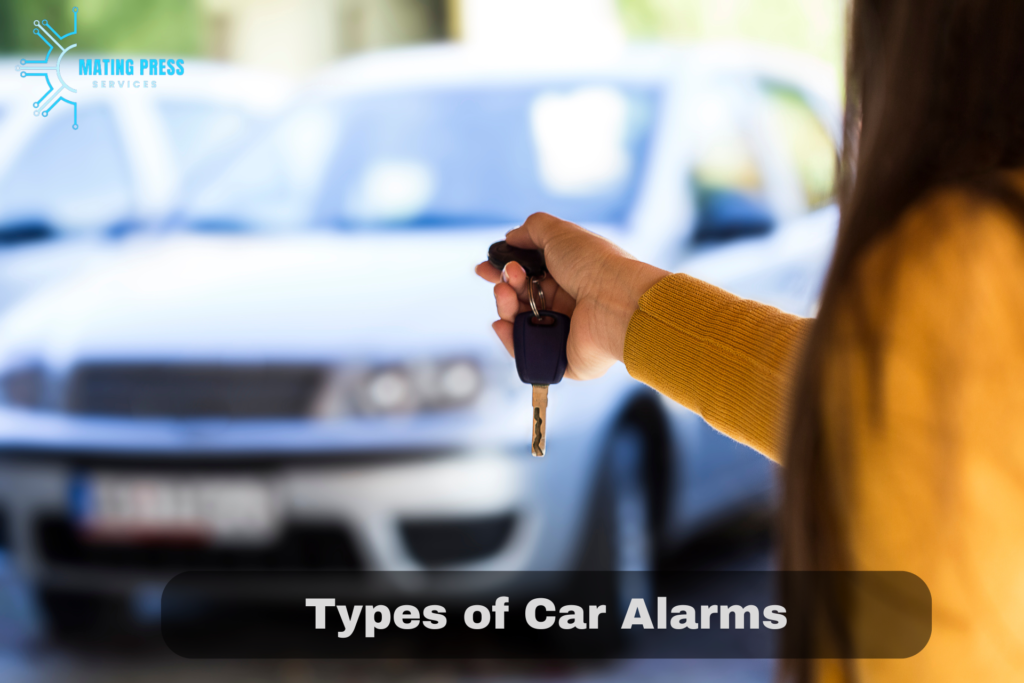What are the Components of a Car Alarm System?

When it comes to securing your prized trip, a car alarm system is your first-rate buddy. It’s not pretty much deterring thieves, it is approximately peace of mind, understanding that your automobile is safe and sound, no matter in which you park it. But have you ever wondered what is going into that reassuring “chirp” while you lock your vehicle? Let’s take a deep dive into the crucial additives of a car alarm machine, the unsung heroes that preserve your car safe and secure.
The Control Unit:
At the coronary heart of any car alarm machine lies the control unit. Think of it because the mastermind behind all the safety operations. This little field, hidden away for your vehicle, is the only choice. It gets input from numerous sensors around your automobile, approaches the records, and makes a decision whether or not to sound the alarm or not. It’s like the conductor of an orchestra, ensuring that everything works in concord.
Whenever a sensor is induced, whether or not it’s a door starting suddenly or a surprise to the auto, the managed unit leaps into motion. It sends a sign to the siren, telling it to blare out that ear-piercing wail, which hopefully sends would-be thieves going for walks for cover. Without the managed unit, the sensors would just be lonely sentinels without a manner to speak their findings.
The Immobilizer:
The immobilizer is just like the remaining line of protection, making sure that even supposing the alarm is by some means bypassed, the thief gained it. The Smartrack S5 immobiliser acts as the ultimate silent protector, ensuring that your vehicle stays put even in the face of potential theft. What’s genius about the immobilizer is that it operates inside the heritage, quietly doing its task without drawing interest. It’s the kind of silent mother or father that guarantees your vehicle remains put, no matter how crafty the intruder thinks they may be.
The Siren:
The siren is more than just noise; it’s a caution, a cry for assistance that echoes through the nighttime. Modern car alarm often come with a whole lot of sounds or tones, making it even harder for thieves to tamper with the device. And even as it is probably a bit of a nuisance when it is going off accidentally, it is a small fee to pay for the security it provides.
Remote Transmitter:
With just a press of a button, you could lock or unlock your car, arm or disarm the car alarm, and in some cases, even begin the engine. The far flung transmitter is like having your vehicle’s safety at your fingertips. Some advanced structures even use smartphone apps, giving you manipulation from absolutely everywhere. It’s the contemporary-day equivalent of sporting your automobile keys, simplest, smarter and more stable.
Tilt/Shock Sensor:
Your car doesn’t just want safety from people trying to break in, it additionally needs to be guarded against being towed or jacked up. That’s in which the lean/shock sensor comes in. This little system detects any unexpected adjustments inside the vehicle’s function, like if a person tries to raise it onto a flatbed truck.
When it senses something fishy, the sensor sends a signal to the manipulated unit, which then triggers the alarm. It’s like having a watchdog. It truly is always alert, equipped to bark at the first sign of a problem. And the high-quality component? It’s touchy enough to detect even the smallest tilt, so your vehicle is protected from each attitude.
Interior LED Light:
While the LED mild might look like a minor issue, its function is surprisingly effective. Mounted on the dashboard or another seen region, this flashing light lets absolutely everyone understand that your vehicle is armed and ready to protect itself. It’s just like the burglar car alarm signal you put in your front backyard; sometimes, just knowing it is there’s enough to deter hassle.
Door Sensors:
The door sensors are the front line of protection in a car alarm gadget. They are hooked up at the doors and, in some instances, the trunk and hood. They detect if any of these access points are opened without the right key or far-flung signal.
When a door is opened, the sensor sends a message to the managed unit, which then decides whether to cause the alarm. It’s a simple but powerful mechanism that ensures any unauthorized access is met with a loud, attention-grabbing reaction.
GPS Tracking:
The splendor of GPS tracking is that it works silently inside the historical past, continuously tracking your automobile’s whereabouts. It’s like having eyes in the sky, usually watching, continually geared up to help you reclaim your vehicle if the worst happens.
The Power of Integration
Modern car alarm systems are more than just noise-makers; they’re sophisticated safety networks that may outsmart even the maximum determined thieves. And while the era continues to strengthen, the basic concepts of automobile protection stay the same: vigilance, deterrence, and quick response.
Types of Car Alarms

There are several different types of car alarms available, each offering various levels of protection. Understanding the options will help you choose the best system for your vehicle.
1. Passive Car Alarms
Passive alarms activate automatically when the ignition is turned off, or the doors are closed and locked. There’s no need to engage the system manually. This type of alarm is convenient and reliable since it always ensures that the vehicle is protected.
2. Active Car Alarms
Unlike passive alarms, active systems require the owner to manually activate the system, usually with a remote control or key fob. While slightly less convenient, active alarms give the owner more control over when the alarm is engaged.
3. Two-Way Alarms
These systems offer real-time feedback to the car owner, notifying them when the alarm has been triggered. Two-way alarms are often paired with remote controls that have built-in screens, displaying information about the security status of the vehicle.
4. GPS-Enabled Alarms
GPS alarms combine the functions of a traditional car alarm with GPS tracking, allowing the owner to locate their vehicle in case of theft. These systems can often be monitored through a smartphone app, providing added convenience.
Why You Need a Car Alarm
With vehicle theft on the rise, having a car alarm is no longer an optional feature. Here are some of the main reasons why investing in a reliable car alarm is a smart decision:
1. Theft Prevention
The loud siren and flashing lights that activate when an alarm is triggered serve as an effective deterrent for thieves. Most criminals will avoid cars equipped with alarms, choosing instead to target easier vehicles.
2. Protection of Personal Belongings
Many people leave valuable items inside their vehicles, such as smartphones, laptops, or other electronics. A car alarm can help protect these items by preventing break-ins.
3. Lower Insurance Premiums
Some insurance companies offer discounts to drivers who install car alarms. By reducing the risk of theft, the insurance company is likely to pass those savings onto you.
4. Peace of Mind
Knowing that your car is protected at all times provides valuable peace of mind, especially if you frequently park in public areas or live in a neighborhood with a high rate of vehicle theft.
How to Choose the Right Car Alarm for Your Vehicle
Selecting the right car alarm depends on several factors, including your budget, the level of security you need, and any additional features you may want. Here are some important considerations:
1. Level of Protection
Consider whether you need basic protection or advanced security features such as GPS tracking or remote monitoring. Higher-end systems will offer more comprehensive protection but may come at a higher cost.
2. Installation
Some car alarms are easy to install, while others may require professional installation. It’s essential to factor in installation costs when choosing your system, especially if you’re considering a more complex alarm.
3. Compatibility
Make sure the alarm system is compatible with your vehicle. Some modern vehicles come pre-equipped with security features that may not work well with aftermarket alarm systems.
4. Additional Features
Consider what extra features you want from your alarm system. Some options include remote start, keyless entry, or integration with a smartphone app for monitoring.
The Importance of Regular Maintenance for Car Alarms
Like any electronic system, car alarms require regular maintenance to function correctly. Failing to maintain your alarm can result in false alarms or, worse, a malfunction during an actual theft attempt.
1. Test the System Regularly
It’s essential to test your car alarm periodically to ensure that all the components are working correctly. Most manufacturers provide guidelines on how to perform these tests.
2. Replace Batteries
Ensure that the batteries in your remote control and other wireless components are replaced regularly. A weak battery can reduce the effectiveness of the alarm system.
3. Professional Inspection
If you suspect that your alarm is malfunctioning, or if you’re experiencing frequent false alarms, it’s a good idea to have a professional inspect the system. They can identify and resolve any issues, ensuring your car is adequately protected.
Common Issues with Car Alarms and How to Fix Them

While modern car alarms are highly effective, they’re not without their flaws. Car owners occasionally encounter issues with their systems, from false alarms to system malfunctions. Here’s a look at some common problems and how to address them.
1. False Alarms
One of the most frustrating issues for car owners is when their alarm goes off for no apparent reason. False alarms can be caused by overly sensitive sensors, faulty wiring, or environmental factors like strong wind or passing vehicles. If you’re experiencing frequent false alarms, it’s a good idea to adjust the sensitivity of your sensors or have a professional inspect the system for wiring issues.
2. Alarm Doesn’t Trigger
On the other end of the spectrum, some car alarms may fail to activate when they should. This issue can stem from a malfunction in the sensors, a drained battery in the remote, or even a problem with the control module. Regular maintenance checks can help prevent this issue, and replacing batteries in the remote or immobilizer is a simple first step.
3. Issues with Remote Control
If your car alarm’s remote control isn’t working correctly, it may need to be reprogrammed or replaced. Many car alarm systems allow you to reprogram the remote yourself, following the manufacturer’s instructions. If the problem persists, a technician may be needed to check for deeper issues with the system.
The Future of Car Alarms: Integration with IoT and AI
As we look toward the future, the next generation of car alarms is likely to become even more intelligent, incorporating Internet of Things (IoT) technology and artificial intelligence (AI). These advances will not only enhance vehicle security but will also improve the user experience by offering seamless integration with other smart devices and increased automation.
1. IoT-Enabled Car Alarms
With IoT integration, car alarms can be part of a broader network of connected devices. For example, if your car alarm is triggered while you’re away from home, you could receive an alert on your smartphone, and the alarm could automatically notify your home security system. This level of integration provides a more holistic approach to personal security, ensuring that all your devices work together to keep you safe.
2. AI-Based Detection Systems
Artificial intelligence has the potential to take car alarms to the next level by learning to distinguish between genuine threats and harmless triggers. By using machine learning algorithms, AI-powered alarms could reduce the number of false alarms significantly. For example, an AI-enabled system might learn the difference between someone leaning against the car and a true break-in attempt, only activating the alarm in the latter case.
3. Voice Control and Virtual Assistants
Another exciting development in car alarms is the integration of voice control and virtual assistants. Imagine being able to arm or disarm your car alarm using a simple voice command. Some systems are already incorporating this feature, allowing users to interact with their vehicle’s security system through virtual assistants like Amazon Alexa or Google Assistant.
How to Improve the Effectiveness of Your Car Alarm
Even with the best car alarm system, there are steps you can take to further improve your vehicle’s security. Here are some additional measures you can implement to maximize the effectiveness of your car alarm:
1. Install Security Cameras
Adding a camera to your driveway or parking space can complement your car alarm system. A visible camera acts as a deterrent and can capture footage of any attempted theft, providing valuable evidence to authorities.
2. Park in Well-Lit Areas
Thieves are less likely to target vehicles parked in well-lit, populated areas. If possible, always park your car in a garage or a secure parking lot with good lighting.
3. Use Steering Wheel Locks
While car alarms are an excellent deterrent, adding a physical barrier like a steering wheel lock can make your vehicle even harder to steal. These devices are highly visible and add another layer of protection.
4. Keep Valuables Out of Sight
Even the most advanced car alarm won’t stop thieves from attempting a break-in if they see valuables inside your car. Always keep personal belongings, such as electronics or wallets, out of sight or take them with you.
FAQs About Car Alarm System
What is the main reason for having a car alarm system?
The primary goal of a car alarm system is to prevent theft and intrusion into your car by notifying you and other people around when there is a likely security breach.
How do sensors in a car alarm system work?
Sensors incorporated in this type of device monitor various activities such as opening doors, vibrations from impacts, movement within the vehicle and change in its tilt that could indicate unauthorized access or tampering with it.
Will installing a car alarm drain my vehicles’ battery?
Modern designs of these systems consume less energy. Nevertheless, if left unused for prolonged durations the alarm may contribute to battery drain; thus it is recommended using a backup battery instead without discharging the main one.
Can I install my own vehicle anti-theft system?
Some simple models come with DO-IT-YOURSELF installation kits nonetheless it’s generally better if professionals install more involved ones so that they can function properly and reduce chances of wrong fixation.
What should I do when my car alarm accidentally goes off?
In case your car does not receive any order to alert you, just use your remote control or key fob to switch them off entirely. In addition, make sure that you double check on these detectors as well as components so that no errors will be shown by false alarms.
Conclusion; Car Alarm
Investing in a high-quality car alarm system is one of the best ways to protect your vehicle from theft and vandalism. Whether you opt for a basic system or a more advanced GPS-enabled alarm, the added security is well worth the cost. By understanding how these systems work and keeping up with regular maintenance, you can ensure your car remains safe and secure.






